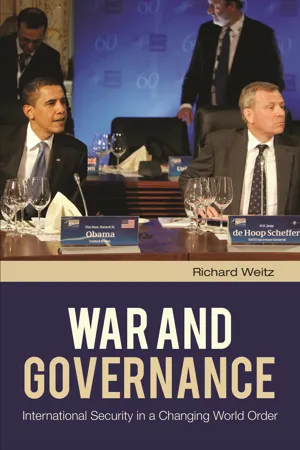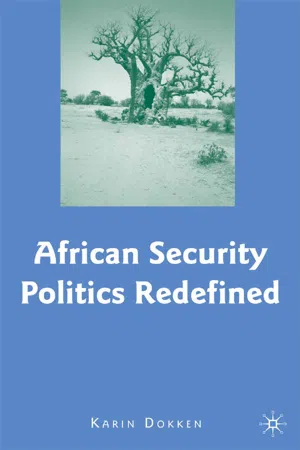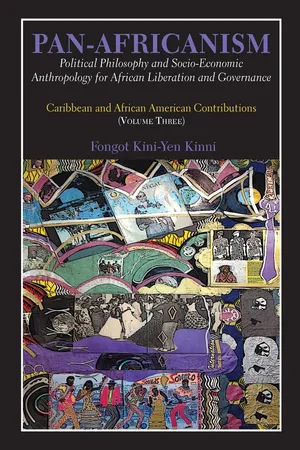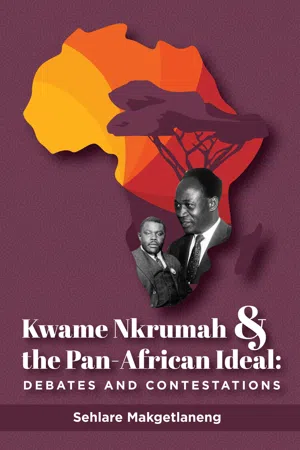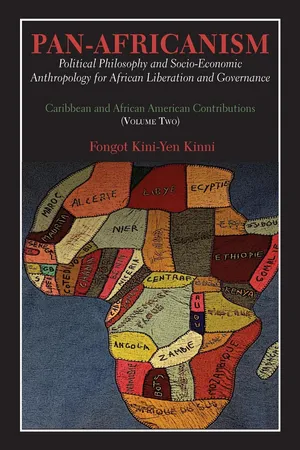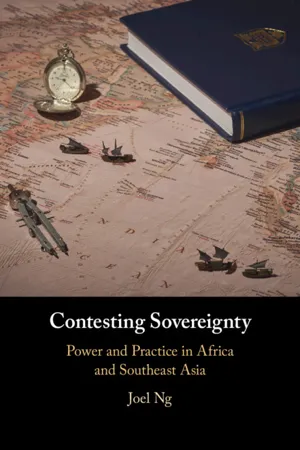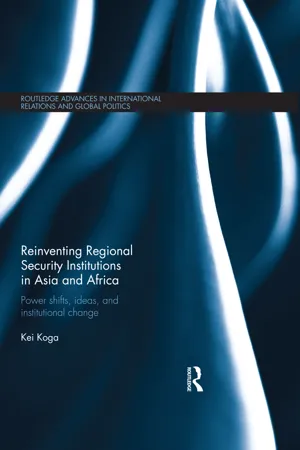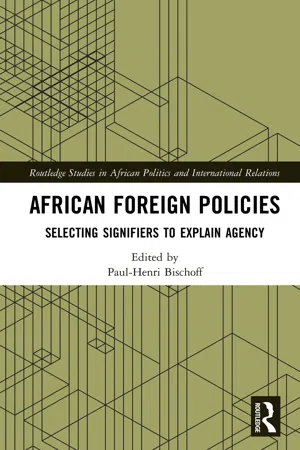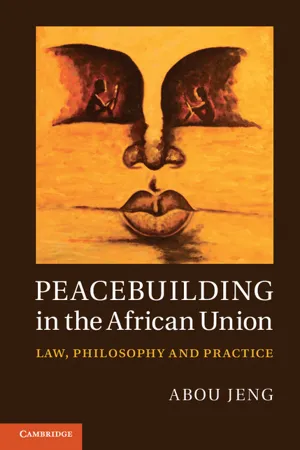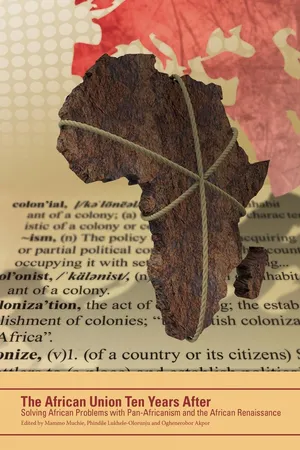Politics & International Relations
African Union
The African Union (AU) is a continental organization consisting of 55 member states in Africa. It aims to promote unity, cooperation, and development among African nations, and to address political, economic, and social challenges on the continent. The AU also works to advance peace and security, human rights, and sustainable development in Africa.
Written by Perlego with AI-assistance
Related key terms
1 of 5
10 Key excerpts on "African Union"
- eBook - PDF
War and Governance
International Security in a Changing World Order
- Richard Weitz(Author)
- 2011(Publication Date)
- Praeger(Publisher)
The African Union The African Union (AU) represents the most concrete step toward the real- ization of political cooperation and economic integration among the coun- tries of the African continent. Its stated commitment to popular participation, good governance, and human rights departs from that of its predecessor—the Organization of African Unity (OAU). The AU also has a stronger legal and institutional framework than the OAU. Nonetheless, the AU has major hurdles to overcome before it can effectively address the major problems confronting Africa in the 21st century. BACKGROUND The African Union was established on July 9, 2002, in Durban, South Af- rica, as a replacement to the OAU. The AU is still a work in progress. Its mem- ber governments continue to develop and define the institution. In order to understand what the AU might become and what it needs it to be, one must first understand what preceded it. In the mid-20th century, African leaders con- cluded that the manifold challenges they faced after independence required them to cooperate, and that establishing a single pan-African institution would facilitate these efforts. This understanding ultimately united two often- opposing groups—Africans of Arab descent, who live mostly in the northern part of the continent, and “black” Africans, who reside predominately in sub- Saharan Africa. The founding of the OAU in 1963 also helped consolidate the separate sub-regional institutions that had already arisen on the continent. It may also have contributed to the process of decolonization, the end of minor- ity rule in Rhodesia, the end of Apartheid in South Africa, and other develop- ments on the African continent during its almost 40-year existence. 4 Chapter 88 War and Governance Even so, conflicting goals among OAU members hampered its effective- ness and legitimacy. Some leaders wanted to form a real union of states, in which the organization would have considerable authority over its members’ policies. - eBook - PDF
- K. Dokken(Author)
- 2008(Publication Date)
- Palgrave Macmillan(Publisher)
This happened on April 26, 2001, when Nigeria deposited its instrument of ratification. The act came into force on May 26, 2001 (AU 2003a). 126 AFRICAN SECURITY POLITICS REDEFINED The goals and the structure of the AU The AU is designed to achieve three broad goals. First, it is intended to bring together the relatively large number of subregional intergovernmen- tal organizations in Africa in order to achieve continent-wide cooperation among African states. Second, it is intended to create conditions to enable African states to engage in social, economic, and political relations in a way that will make war between them unlikely. Third, it aims at designing an institutional structure that will make it easier for African states to partici- pate in the international markets and in international negotiations related to trade, finance, and debt. To work for these objectives, the AU has estab- lished 17 institutions. - eBook - PDF
- Kini-Yen Kinni(Author)
- 2015(Publication Date)
- Langaa RPCIG(Publisher)
57 Work with relevant international partners in the eradication of preventable diseases and the promotion of good health on the continent. The Vision of the AU The AU is Africa’s premier institution and principal organization for the promotion of accelerated socio-economic integration of the continent, which will lead to greater unity and solidarity between African countries and peoples. The AU is based on the common vision of a united and strong Africa and on the need to build a partnership between governments and all segments of civil society, in particular women, youth and the private sector, in order to strengthen solidarity and cohesion amongst the peoples of Africa. As a continental organization it focuses on the promotion of peace, security and stability on the continent as a prerequisite for the implementation of the development and integration agenda of the Union. The Organs of the AU The Assembly o Composed of Heads of State and Government or their duly accredited representatives. The Assembly of Heads of State and Government is the supreme organ of the Union. The Executive Council Composed of Ministers or Authorities designated by the Governments of Members States. The Executive Council is responsible to the Assembly. The Commission Composed of the Chairperson, the Deputy Chairperson, eight Commissioners and Staff members; Each Commissioner shall be responsible for a portfolio. The Permanent Representatives’ Committee Composed of o Permanent Representatives of Member States accredited to the Union. The Permanent Representatives Committee is charged with the responsibility of preparing the work of the Executive Council. Peace and Security Council (PSC) by decision AHG/Dec 160 (xxxvii) of the Summit of Lusaka, July 2001, a decision was made for the creation within the African Union of the Peace and Security Council. The Protocol establishing the PSC is in the process of ratification. - eBook - PDF
Makgetlaneng: Kwame Nkrumah and the Pan-African Id
Debates and Contestations
- Sehlare Makgetlaneng(Author)
- 2021(Publication Date)
- Institute for Preservation and Development(Publisher)
Fourthly, the role of regional economic communities as building blocks for the African continental unity and integration should be emphasised or underlined. It submitted its report on the study of the African Union government to the Seventh Session of the Assembly of Heads of State and Government in Banjul, Gambia in July 2006. In presenting its detailed report, A Study on an African Union Government: Towards the United States of Africa, the Committee highlighted the reality that Africa is characterised by over-dependence on the external actors and that the continent has not fully exploited its potential on the national, regional and continental levels in the areas of trade, education and health. It points out that “a United Africa would have the unique potential of producing most types of food and agricultural produce throughout the year” 95 and that in the context of globalisation “the challenges of over-dependence and under-exploitation of its potentials have increased the marginalisation of the continent in world affairs.” 96 The study outlines sixteen areas on which the AU government should focus. These focus areas are continental integration, education, training, skills development, science and technology, energy, environment, external relations, food, agriculture and water resources, gender and youth, governance and human rights, health, industry and mineral resources, finance, peace and security, social affairs and solidarity, sports and culture, a trade and customs union, infrastructure, information technology, and biotechnology. - eBook - PDF
- Kini-Yen Kinni(Author)
- 2015(Publication Date)
- Langaa RPCIG(Publisher)
572 Raising the quality of life and living standards of all Africans; Settling conflicts and all forms of arguments and disputes between member states – through pre-emptive diplomacy, peaceful negotiation and constructive peace-building strategies. In order to achieve these goals Member States pledged themselves to harmonize their policies in the following fields. Political and diplomatic cooperation; Economic cooperation, including transport and communication; Educational and cultural cooperation; Health, sanitation, and nutritional cooperation; Scientific and technical cooperation; and Cooperation for defence and security. The OAU Charter outlined the main principles that are also stated in Article II of the CHARTER as follows The recognition of the sovereign equality of all Member States; The non- interference in the internal affairs of States; The respect for the sovereignty and territorial integrity of each State and for its inalienable right to independent existence; The peaceful settlement of disputes by negotiation, mediation, conciliation or arbitration; The unreserved condemnation in all its forms, of political assassination as well as of subversive activities on the part of neighbouring States or any other States; The absolute dedication to the total emancipation of the African territories which are still dependent; The affirmation of a policy of non-alignment with regard to ail blocs. It must be stressed here that in proclaiming the OAU principles and objectives, the Founding Fathers of the Organization of African Unity envisaged clearly a unity “that transcends ethnic boundaries and national differences.” But as the years progressed it was realized that ethnic conflicts and even trans-national conflicts started to betray the original objectives of the OAU. Much of this could be attributed to the fact that the leaders failed in promoting national representation and good governance in their respective countries. - eBook - PDF
Contesting Sovereignty
Power and Practice in Africa and Southeast Asia
- Joel Ng(Author)
- 2021(Publication Date)
- Cambridge University Press(Publisher)
part ii The African Union The partitioning of Africa in 1885 at the Berlin Conference is inscribed in the minds of Africa’s political elite. On the one hand, it divided the continent artificially, and on the other hand, it represented the gravest violation of African polities’ sovereignty until the wave of decolonisa- tion in the 1950s and 1960s. Two counter-responses therefore developed: to reunite the continent from the colonial divisions, or to re-assert state sovereignties upon independence. The OAU eventually settled on the latter reaction and left colonial boundaries intact, while developing strict understandings of sovereignty and non-interference. However, the former response – to reunite Africa – has had the greater aspirational quality, and Pan-Africanism serves as an underlying norm for its continental international relations. 1 The transition from the OAU to the African Union was, at the time, an unexpected sequence of events but a turning point for African regionalism. Commitment was made to establish the ‘African Union’ in 1999. Its charter, the ‘Constitutive Act of the African Union’, was adopted at the Lomé Summit in 2000. It then began a transitional period involving legal handover processes, and this was finally com- pleted in 2003, shutting down the OAU permanently. In July 1999, the Algiers Summit raised numerous discussions about the state of African regionalism, against a backdrop of the failures to make progress on the 1991 Abuja Treaty and recognition that contin- ental security mechanisms were not working with the proliferation of conflicts around Africa. The summit ended leaving many issues unre- solved. Muammar Gaddafi thus called for an extraordinary summit at Sirte in September, having just one item on its agenda: strengthening African capacity to deal with new challenges. - eBook - ePub
Reinventing Regional Security Institutions in Asia and Africa
Power shifts, ideas, and institutional change
- Kei Koga(Author)
- 2016(Publication Date)
- Routledge(Publisher)
However, this expectation began to shift after it turned out that the end of the Cold War would likely counteract the OAU’s political objectives. In submitting his report assessing world affairs, OAU Secretary General Salim Ahmed Salim argued that the disappearance of the East–West rivalry limited the policy option for African states to ally with the Eastern blocs to pressure South Africa because the improvement of the Eastern European states’ relations with South Africa was generated by South Africa’s economic assistance to those countries despite its maintenance of apartheid (OAU Secretariat 1990a; 1990b, 10–13). In response to these new concerns, the Assembly decided to issue an organizational assessment of the changing international environment through the Declaration of the Assembly of Heads of State and Government of the Organization of African Unity on the Political and Socio-Economic Situation in Africa and the Fundamental Changes in 1990 (OAU Secretariat 1990c).In that statement, the OAU identified two significant African challenges. The first challenge was a “threat of marginalization” in both political and economic terms (OAU Secretariat 1990c). The East–West rivalry had disappeared, Eastern Europe had democratized, and there was an increasing fear of the trend toward regional economic blocs becoming the center of world attention, resulting in the exclusion of the African continent from the international political agenda. The second challenge was Africa’s ability to maintain a stable security arrangement as the foundation of socioeconomic development. The OAU declared that “the possibilities of achieving [socioeconomic development] will be constrained as long as an atmosphere of lasting peace and stability does not prevail in Africa” and that member states determined to “work together towards the peaceful and speedy resolution of all of the conflicts” in Africa (OAU Secretariat 1990c). Therefore, the OAU aimed to strengthen its own institutional capacity to stabilize regional security despite its lack of resources.The OAU, however, confronts its normative constraints: the noninterference principle. This principle would have to be somewhat relaxed if the OAU desired to effectively manage internal conflicts and prevent the spillover effect by itself. This is because the possibility of external intervention still existed when internal conflicts deteriorated. To prevent such intervention, the OAU’s own political and legal foundation to address Africa’s internal conflicts was—at least—necessary. However, another problem is that if the noninterference principle was relaxed without careful consideration, more political exploitation of intervention and the political division of Africa would likely result. Considering the political reality that African states were ethnically and religiously divided and that state borders did not reflect those divisions because they were a byproduct of European political negotiation over the African territory in the nineteenth century, internal conflicts could quickly be exacerbated (e.g., Herbst 2000). Thus member states became uncertain about the OAU’s ability to manage conflicts in Africa. - eBook - ePub
African Foreign Policies
Selecting Signifiers to Explain Agency
- Paul-Henri Bischoff(Author)
- 2020(Publication Date)
- Routledge(Publisher)
With personalisation and individualisation comes the risk of failure to institutionalise solutions to the problems confronting the organisation. It is the challenge of achieving sustainability and predictability in one’s interactions with others. One explanation is that the founding group for a collective continental organisation in 1963, heads of states such as Kwame Nkrumah, Julius Nyerere, and others came to espouse the idea of life presidencies or one-party states which revolved around personality cults. In other words, even beyond the OAU, few, if any, had an interest in a depersonalised or institutionally more autonomous AU. The successors to the founders who oversaw the CSSDCA, the Constitutive Act, and survived Gaddafi’s bid for leadership of the organisation failed to appreciate the imperative to depersonalise the different dimensions of African agency.The result was that AU foreign policy agency rose and declined with certain strong personalities such as Thabo Mbeki, Olusegun Obasanjo, Meles Zenawi and Abdelaziz Bouteflika, let alone strong AUC chiefs such as Alpha Konare. The strategic partnerships the AU has embarked on attest to this.AU foreign policy on international cooperation: The record on partnerships
AU declarations form an important aspect of African agency. Zondi (2012) posits that African agency in international affairs largely depends on African common positions and declarations. This suggests that common African positions are an important element of the AU’s foreign policy engagement in that they set the tone and terms of engagement with the rest of the world. However, the evidence suggests that the divided positions of African states on certain central issues affect the AU’s ability to formulate durable collective foreign policy position.African agency has been something of an anthem at the AU, encapsulated in the phrase “African ownership and leadership”. Historical evidence shows that by the time Africa renegotiated the Lomé Agreement with Europe in the late 1990s, the OAU was concerned with the salience of African agency in this significant inter-regional partnership. Concerning the renewed partnership agreement, the negotiating team was advised “[it] is important that there is no Eurocentric perspective of these essential elements. The ACP must give their perspective of these elements which takes on board the social, cultural, historical, political and economic specificities of our states” (OAU, 1999: 9). - eBook - PDF
Peacebuilding in the African Union
Law, Philosophy and Practice
- Abou Jeng(Author)
- 2012(Publication Date)
- Cambridge University Press(Publisher)
Yet despite the OAU providing an interactive political platform for African leaders to engage and reflect, its normative and structural inadequacies could no longer serve as dependable denominators in tackling Africa’s postcolonial disorder. Under its watch Africa witnessed a proliferation of problems ranging from violent conflicts, human rights abuses and state institutional failure to deepening impoverishment. In the end, neither Africa’s institutions, nor the instruments and structures of international law, could make much difference. But with the disbanding of the OAU, a new instrument – the Constitutive Act of the African Union – was installed as part of attempts to forge a way forward, especially in the context of peacebuilding. 162 the genesis of the African Union - eBook - PDF
Muchie: The African Union Ten Years After
Solving African Problems with Pan-Africanism and the African Renaissance
- Mammo Muchie, Phindil Lukhele-Olorunju, Mammo Muchie, Phindil Lukhele-Olorunju(Authors)
- 2013(Publication Date)
- Africa Institute of South Africa(Publisher)
The next section analyses the realities and illusions inherent in Ghaddafi’s disposition to integration and the concluding section focuses on the measures to be taken to preserve Africa’s destiny beyond Ghaddafi’s integration rhetoric. 5 GHADDAFI AND THE African Union INTERNATIONAL INTEGRATION IN AFRICA: HISTORICAL AND THEORETICAL PERSPECTIVES International integration refers to the process by which supranational institutions replace national ones. It is the gradual shifting upward of sov-ereignty from state to regional or global structures. 4 Integration connotes the task of increasing the quantity and quality of interconnections among states, at a minimum by harmonisation and cooperation in functional agen-cies; at the maximum through economic and political federation or union. 5 The latter conception is relevant to our present study of African efforts at promoting international integration. Political events reveal that Africa has reached the minimum level of integration through the establishment of such a functional body as the AU. However, the maximum level of a federal union which Ghaddafi advocated is still unrealised. The task here is to situate African integration in history and then dwell on the rich theoretical debates underpinning the possibilities and impossibili-ties relating to the achievement of a federal union in Africa. Pan-Africanism actually laid the foundation for African unity leading to the institutionali-sation of the OAU and its transformation to the AU. This history has been overwhelmingly captured in the existing literature. 6 Because a rich debate exists on regional integration in Africa 7 , it is therefore not necessary to be-labour the point here. The point which the paper seeks to emphasise here is that decolonisation reinforced regional integration in Africa. Without the binding structure of the colonial administrations, Africa’s newly independent states were confronted with the problem of disunity.
Index pages curate the most relevant extracts from our library of academic textbooks. They’ve been created using an in-house natural language model (NLM), each adding context and meaning to key research topics.
